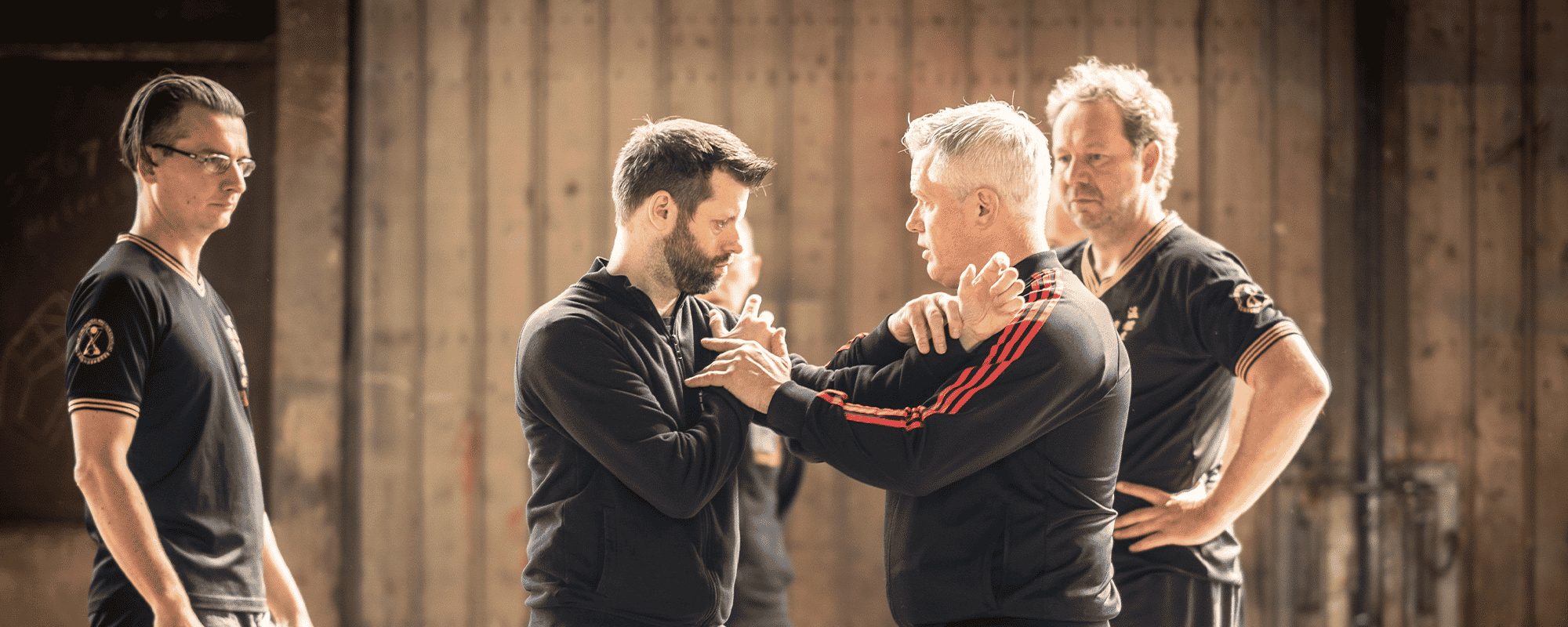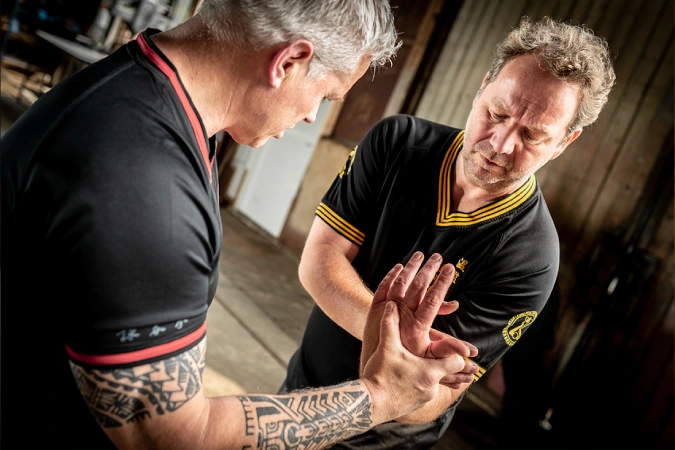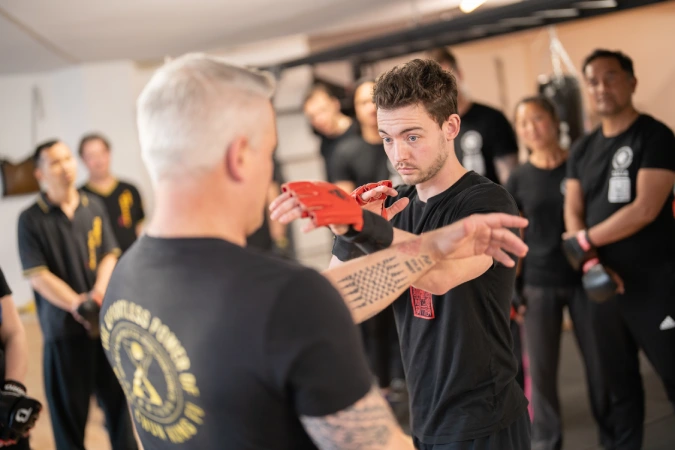
Practical Wing Chun
ABOUT WING CHUN KUNG FU
What is Practical Wing Chun (Wing Chun, Wing Tsun, Ving Tsun etc.)?

The main goal of the Practical Wing Chun (which is only taught in the Netherlands at the official UCT Schools) system is to teach the most practical self-defense to the students. Besides the self-defense aspect, at our martial arts schools a lot of attention is paid to the mental resilience, health of the students and for their overall fitness level.
We want to prepare the students as best as possible for any conflicts on the street, in entertainment venues and situations that may be perceived as threatening. Assuming that a healthy body and mind is an essential component in effective self-defense, Wing Chun classes at our UCT Schools pay ample attention to developing these two components.
While training to become an adequate Wing Chun practitioner, we follow the unique method of teaching Wing Chun. We start with the Siu Nim Tao form, the form which contains the most common techniques you might need in a threatening and possibly already escalated situation. During this time we lay the foundation in the students for the more advanced Wing Chun forms such as the Cham Kiu form, Biu Jee form and the Mok Yan Chong (Wooden Dummy form)
For this process, Sifu Benno Wai developed the “Wing Chun’s Educational Circle of Continuous Improvement”. A so-called instructors code that helps UCT Instructors to support the Wing Chun students in their resilience training.
Sifu Benno Wai
After many years of training in Tae Kwon Do (second dan and winner of several National and International titles) and Kyokushin Karate (winner of two Kyokushin tournaments) Sifu Benno Wai started in 1998 with the Wing Tsun system of GM Leung Ting. After finishing the system in its entirety, he decided to start teaching for himself in 2003. He changed a number of technical elements (form techniques, strategies) of the Wing Tsun system which he thought could be improved for street practice. During this period, Sifu Benno Wai invested much time in training and researching other Wing Chun lineages. For example, he came into contact with Sifu David Peterson of the Wong Shun Leung Wing Chun system. During this time Sifu Benno Wai was much inspired by not only Sifu David Peterson but also by Sifu Morten Ibsen (still a valued friend to this day)
Through two of his closest personal friends in the world of Wing Chun, Sifu Martin Brogaard and Sifu Pui Yee, he came into contact with GM Wan Kam Leung in 2007. GM Wan Kam Leung is widely regarded as the best Wing Chun practitioner of our time (regardless of lineages) Immediately after meeting GM Wan Kam Leung, Sifu Benno Wai was accepted by him as a private student and since then he (Sifu Benno) has been visiting GM Wan Kam Leung two to three times a year in Hong Kong.
Meanwhile, Sifu Benno Wai has also mastered the Practical Wing Chun system. Siu Nim Tao, Cham Kiu, Biu Jee, Mok Yan Chong, Luk Dim Poon Kwan, Bart Cham Dao and the Iron Shirt Hei Gung (Qi Gong, Chi Kung) developed especially for Wing Chun.
With this, Sifu Benno Wai has joined a very small select group of Practical Wing Chun Masters.
In addition to his first passion (Practical Wing Chun), Sifu Benno Wai also holds the Black belt Brazilian Jiu Jitsu and is Chief Instructor for GM Steve Tappin’s Escrima Concepts.
Together with his regular training partner and friend Sifu Pele Nguyen, he has developed the successful kung fu program Jing Wu Kids for children. This great program for children of all ages is taught at select UCT Schools in Holland, England and Spain.
THE BENEFITS
Benefits of Practical Wing Chun Kung Fu
In addition to being a highly effective form of self-defense, Practical Wing Chun offers the disciplined practitioner a varied program to improve physical and mental health.
Because Practical Wing Chun assumes that it is often the weaker party who must defend against a stronger attacker, most techniques are designed to teach the use of the opponent’s strength.
An effective way of fighting which originated in China more than 250 years ago has in recent years increased in popularity. And where many other fighting systems (methods) propagate forward aggression (Krav Maga, Kick Boxing, MMA etc.), the Practical Wing Chun Kung Fu prefers a more subtle approach, where “dosed” aggression can sometimes be part of the defense. Not for nothing is this Kung Fu system used by ‘special’ units in Hong Kong, China and Taiwan for one on one combat.
Although in principle a conceptual system, the many techniques and strategic solutions can sometimes be experienced as technically complicated and it is not a system which you will master quickly on a high level.

However, the basics of defending yourself effectively on the street are already taught in the beginner’s programs so the practitioner will feel a sense of efficient defensibility fairly quickly.
For the inspired practitioner, Practical Wing Chun Kung Fu is often a lifelong journey of learning, understanding, practicing and perfecting.
The practitioner who has caught the Practical Wing Chun ‘virus’ usually quickly discovers that delving into this practical self-defense system provides many additional benefits in terms of physical and mental resilience, as well as being an ongoing journey to ultimate resilience knowledge and new insights into that amazing ‘puzzle’ of our minds and bodies.
Some of the benefits in a row:
- Physical and mental resilience
- Flexible outlook on life
- Knowledge and control over one’s own physical body
- Improved self-control
- Growth of knowledge
- Improving confidence
- Increase in functional physical strength
Improved stamina through Kung Fu
Even though it is not the first priority of Kung Fu training, ample time is usually spent on Functional Stamina training. These exercises can, in most cases, be directly traced back to the fighting applications of Practical Wing Chun Kung Fu. The exercises developed and compiled by UCT International have been incorporated into our own training program, the FSC (Functional Strength & Conditioning).
Over time, the practitioner will gain an improved sense of strength and cardio.
Improved coordination of the body
Because many techniques and drills are drilled both counterclockwise and clockwise and many of the techniques in the Practical Wing Chun system consist of arm movements that are separate in terms of movement. In addition, the fact that your legs (feet) must also be able to move independently of each other and still be able to move efficiently means that the Practical Wing Chun practitioner will have a heightened sense of physical coordination.
Improved memory
Precisely because this Practical self-defense system contains so much information, the practitioner is expected to have continuous concentration and can expect much to be expected of his/her memory.
Patience and perseverance
Patience is perhaps one of the most important requirements for successfully practicing this wonderful system, Practical Wing Chun, and perhaps, over time, mastering it in its entirety. All this requires from the practitioner a considerable amount of perseverance. Anyone can learn this system, but it requires the same perseverance, a quality that often determines whether or not you succeed in the society in which we live.
Practical Wing Chun is truly ‘The High Education’ of the martial arts!
PRIVATE TRAINING
1 on 1 training in Practical Wing Chun (personal guidance)
“Citius consequitur in brevi tempore” (Faster results in short time)
In addition to the normal group classes, you can inquire about personal guidance from a professional instructor. UCT International is a professional organization and we strive to offer professional personal coaching as well.
There are several professional instructors who can customize a package for you. These lessons can be booked either during the day or in the evening, where the daytime possibilities are broader than in the evening hours.
What can you expect from private lessons?
In a private lesson, your personal tutor is not only your instructor but also your sparring partner. This means that you are ideally “fed” and immediately corrected when needed.
The structure of a private lesson is tailored to the student’s personal achievable goals. In order to efficiently achieve the fastest possible result and achieve more than the student has previously thought possible.
The immediate benefits van een privé les op een rij:
- Answers to questions that in a normal group class there is not always enough time to adequately address.
- Clear picture of your knowledge and skills.
- Accelerated knowledge acquisition and integration of the techniques.
- You get a deeper knowledge of the components of the techniques | concepts to be learned.
- Better polishing of your technical skills.
- Regular private lessons also provide better motivation to achieve your goals.
- Detailed explanation of principles | strategy | structure
- Continuous corrections ‘hands on
- A training partner who can technically ‘feed’ your attacks on a high level
- When you have missed a number of normal group lessons, you will be
- brought back to the last level in an accelerated manner.
Which UCT instructors give private lessons?
Any certified UCT Instructor (Practical Wing Chun Instructor, ACE (Escrima) Instructor or Brazilian Jiu Jitsu Instructor) can provide you with this exclusive training at one of the UCT Academies or UCT Schools.
For more information on prices etc. please contact us at info@uct-international.com or ask your group instructor directly.
Do you have a preference for a certain instructor? Please indicate in the mail who you would like to be trained by. This way we can send effective information and, if necessary, personal contact information of the requested Instructor / Coach.
LEVELS
Practical Wing Chun Levels
Basic structure of UCT’s Practical Wing Chun education:
Siu Nim Tao – Basic Level
The student starts his training naturally with the Basic Level, some important training objectives are:
- General Physical Preparedness
- Basic self protection training
- Different fight-stages
- Basic training in the CST™ (Conflict Strategies & Tactics) program
- Basic understanding of the first Practical Wing Chun form: Siu Nim Tao
- Tactile reflextraining
- Basic understanding of the 5 centre lines and in connection the importance of the diagonal lines

Cham Kiu – Mid Level
After a period of approximately 24 months the student will proceed to the Mid Level, some important objectives:
- Specific physical preparedness
- Focus on duel fighting
- Stress reactivity training
- Tactile reflextraining with covering distance
- Basic understanding of the second Practical Wing Chun form: Cham Kiu
- Sparring drills, five fighting distances
- Basic weapon skills
- Understanding of how to defend against superior strength

Biu Jee – Advanced Level I
After finishing the Mid Level, the student proceeds to the Advanced Level. This is the stage where diligence is a must, the student has to understand here that the Advanced Level training is a refinement of Basic and Mid Level training!
- Refinement of Basic and Mid Level training
- Refinement of Physical skills
- Developing the ability to apply bursts of energy in short range combat situations
- Being able to implement closed quarters fighting tactics in ground-fighting
- Concepts and Fighting strategies of the Practical Wing Chun system
- Basic understanding of the Practical Wing Chun Biu Jee concepts and it’s form
Muk Yan Chong | Luk Dim Boon Kwan | Bart Cham Dao – Advanced Level II
Here we enter the level of training which is for those who kept training and growing. These students have gotten to the understanding that consistency is the secret to achievement.
- Continuous refinement of our skill level
- Understanding of our Muk Yan Chong form and it’s concepts
- Weapon strategies and concepts (LDBK, BCD)
- How to implement the weapon concepts and principles into unarmed combat



